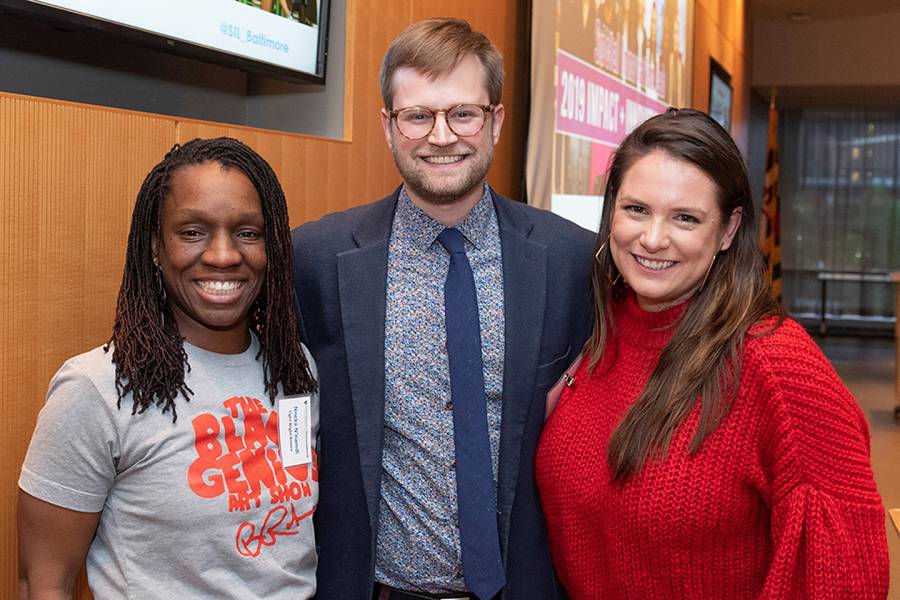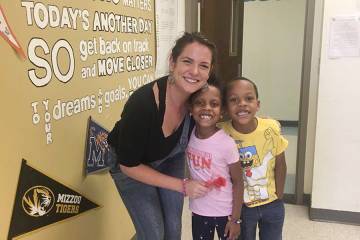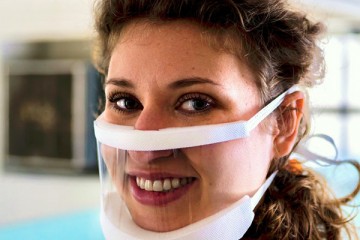Two socially conscious business ventures won big Tuesday in a ceremony hosted by the Johns Hopkins Social Innovation Lab. Happy Teacher Revolution, a mission to promote self-care for teachers, took first place with a $15,000 prize, and Fight Blight Bmore, a data-driven approach to combating urban blight, took home $10,000.
Danna Thomas, founder of Happy Teacher Revolution, says the accelerator program helped her transform from "Ms. Thomas, kindergarten teacher" to "Danna, leader of a revolution."
A Johns Hopkins alum and former Baltimore City Public Schools teacher, Thomas created her venture after her own experiences with stress and burnout on the job. Now, Happy Teacher Revolution is an international movement that provides wellness support for teachers, with volunteers running the program in 21 U.S. states; Toronto, Canada; and Dakar, Senegal.
Based on a 12-step model, Happy Teacher Revolution offers in-person support groups and an online curriculum that aims to improve mental health and reduce job turnover.
"Last night was completely surreal," Thomas says of her first-place win. "It was really a statement that we need to support the mental health and wellness of our educators."
Looking forward, Thomas—who graduated from the Johns Hopkins School of Education in 2013—plans to create a "Revolution Tour Bus" that can visit school sites after incidents of trauma, such as shootings or natural disasters. She's also working to expand the Happy Teacher Revolution to parts of China.
Also see
Wednesday's second-place winner, Fight Blight Bmore, is the brainchild of local entrepreneur Nneka N'namdi. Her economic, environmental, and social justice initiative aims to address city blight—the concentration of vacant or substandard buildings in a neighborhood—with community-led, data-driven solutions.
N'namdi says she plans to use the $10,000 from the Social Innovation Lab to continue developing her centerpiece tech, "the Fight Blight App," which will allow users to identify, report, and track data on abandoned or unsafe sites. This summer, she'll work with partners from YouthWorks to help test the app's beta version.
The ceremony Wednesday marked the culmination of the 2018-19 cohort of the Social Innovation Lab accelerator program. Run by Johns Hopkins Tech Ventures, the intensive six-month program provides funding, mentoring, and workspace to emerging businesses and nonprofits with altruistic aims. Since 2011, the lab has helped 72 ventures secure more than $37.5 million in funding.
For the program's final ceremony, cohort members voted among themselves to select winners from their group of 10 projects. In a twist this year, participants opted to split the $25,000 funding pot between two ventures.
"I really love that concept of collaboration—all these teams are worthy and doing things that are really important," says N'namdi, who adds that she plans to share space in her organization's Hack Hub innovation space with another venture from her cohort.
The other 2018–2019 Social Innovation Lab teams are:
Ars Medica, a space where doctors and medical students can share their stories and support each other in their journey toward more humane and compassionate medicine. Core team: Javier de la Maza, Marielle Bugayong, Taj Keshav, and Jianyi Nie
Baltimore Farm to Clinic Project, which provides healthy foods and nutrition education to vulnerable individuals living in underserved neighborhoods. Core team: Bailey Miles, Kate Rediger, Jon Shaw, Laura Harding-Fukushima, Joann Williams, and Brian Adams
Baltimore Job Hunters Support Group, which assists older, long-term unemployed workers with the social, emotional, and psychological pain that comes with midcareer job loss by providing counseling, coaching, information and referral services, outreach, and advocacy. Core team: Janet Glover-Kerkvliet
Be. Virtual, a youth-built virtual reality technology for social-emotional learning. Core team: Tonee Lawson
Health 3D, a student-run social venture that creates customized, 3D-printed education equipment for children in hospitals. Core team: Chris Shallal, Kirby Leo, and Jody Mou
MOMCares, which provides postpartum doula support to black mothers navigating a NICU experience with their child. Core team: Ana Rodney
Roots & Raíces, a social enterprise geared toward creating a platform for immigrant artists and musicians to come together to support, highlight, and celebrate immigrants through the arts and civic action. Core team: Valeria Fuentes, Abbey Parrish, Torianne Schiff, C Kim, Luz Orozco, Eean Logan, Ariel Foster, and Adrianna Fuentes
Rose, a technology-driven mental health company simplifying the way patients experiencing stress, depression, and anxiety seek and receive care. Core team: Kavi Misrilall










